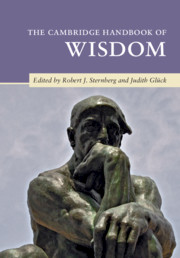Book contents
- The Cambridge Handbook of Wisdom
- The Cambridge Handbook of Wisdom
- Copyright page
- Dedication
- Contents
- Figures
- Tables
- Contributors
- Preface
- Part I Foundations of Wisdom
- Part II Conceptions of Wisdom
- Part III Measures of Wisdom
- Part IV The Development of Wisdom
- Part V Cultural Perspectives on Wisdom
- Part VI Wisdom and Other Psychological Constructs
- Part VII Wisdom in Action
- 29 Wise Leadership
- 30 Professional Wisdom
- 31 Wisdom in Medical Decision-Making
- 32 Wisdom in History and Politics
- 33 The Urgent Need for Social Wisdom
- Part VIII Conclusions
- Index
- References
30 - Professional Wisdom
Functions and Processes of Psychotherapeutic and Judicial Wisdom
from Part VII - Wisdom in Action
Published online by Cambridge University Press: 15 March 2019
- The Cambridge Handbook of Wisdom
- The Cambridge Handbook of Wisdom
- Copyright page
- Dedication
- Contents
- Figures
- Tables
- Contributors
- Preface
- Part I Foundations of Wisdom
- Part II Conceptions of Wisdom
- Part III Measures of Wisdom
- Part IV The Development of Wisdom
- Part V Cultural Perspectives on Wisdom
- Part VI Wisdom and Other Psychological Constructs
- Part VII Wisdom in Action
- 29 Wise Leadership
- 30 Professional Wisdom
- 31 Wisdom in Medical Decision-Making
- 32 Wisdom in History and Politics
- 33 The Urgent Need for Social Wisdom
- Part VIII Conclusions
- Index
- References
Summary
- Type
- Chapter
- Information
- The Cambridge Handbook of Wisdom , pp. 676 - 697Publisher: Cambridge University PressPrint publication year: 2019
References
- 1
- Cited by



